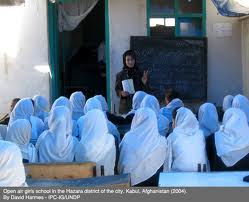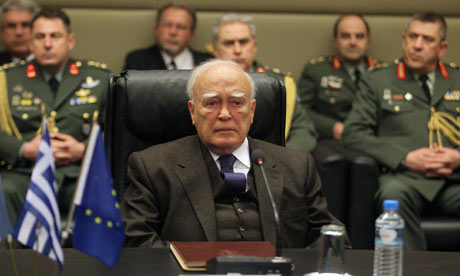by Richard Gowan | Feb 19, 2012 | Conflict and security, Global system, Middle East and North Africa
 This is just a quick note for any GD readers in Abu Dhabi. On the evening of Monday 20 February, I’ll be interviewing Stanford University’s Stephen Stedman live at NYU Abu Dhabi about recent work he’s been doing with Kofi Annan on elections, crisis management, events in the Middle East and the future of global governance.
This is just a quick note for any GD readers in Abu Dhabi. On the evening of Monday 20 February, I’ll be interviewing Stanford University’s Stephen Stedman live at NYU Abu Dhabi about recent work he’s been doing with Kofi Annan on elections, crisis management, events in the Middle East and the future of global governance.
It’s filling up, but you can still register at this link.
by David Steven | Feb 16, 2012 | Climate and resource scarcity, North America
I am hacked off by almost everything about the breathless exposé of Heartland’s (purported) internal strategic documents. Here’s Think Progress’s measured presentation of the scoop:
Heartland Documents Reveal Fringe Denial Group Plans to Pursue Koch Money, Dupe Children and Ruin Their Future
So what do we have? Nothing less or more than you’d expect. Papers that show the organisation believes climate change is a hoax and that it wants to raise money to promote that view. As if any of that’s a surprise.
There’s really no news here at all. No smoking gun. No admission that Heartland knows global warming is real, for example, but isn’t saying so. Or that it was behind the hacking of UAE’s Climate Research Unit. Rarely has so much hot air (geddit?) been expended over so little.
Now I know why I am supposed to get all riled up by this story. (i) Heartland is wrong. (ii) It’s wrong in a way that is convenient for its funders. (iii) And, of course, this is sweet revenge Climategate – where the media also got its knickers-in-a-twist about innocuous emails written by climate scientists.
But none of these reasons stop this being a stupid non-story. Especially not the fact that something similar (or worse) was done to ‘our’ side.
But then… then… there’s Heartland’s asinine reaction. I know that, in the media age, s/he who is most offended against wins, but this is truly ridiculous:
The individuals who have commented so far on these documents did not wait for Heartland to confirm or deny the authenticity of the documents. We believe their actions constitute civil and possibly criminal offenses for which we plan to pursue charges and collect payment for damages, including damages to our reputation. We ask them in particular to immediately remove these documents and all statements about them from the blogs, Web sites, and publications, and to publish retractions.
It’s a criminal offence even to comment on this story? And you’re worried about your reputation? What reputation?
Anyway – I have commented on Heartland-gate and will continue to do so if I don’t have anything better to do. And, if Heartland doesn’t like it, I think the gentleman below captures my sentiment very well….

Update (21/2/12): Predictably enough, this sorry saga has degenerated further. On the one hand – and quite extraordinarily – the Heartland crew has followed through on its threat to get legal with the blogosphere, going after sites that have:
Posted links to a document titled “Confidential Memo: 2012 Heartland Climate Strategy.”
Posted links to certain other documents purporting to be those of The Heartland Institute.
Posted blogs or web pages discussing any or all of these documents.
The final clause would draw into its net most of the Western world’s media – and Global Dashboard. And this from an allegedly libertarian think thank.
Then we have last night’s confession by Peter Gleick that he obtained and then leaked the documents. Time will tell if he also faked one or more of them. Idiot.
(BTW how long until Gleick resigns from this Task Force on Scientific Ethics?)
by Seth Kaplan | Feb 16, 2012 | Economics and development

There have been growing demands for greater independent evaluation of foreign aid for at least half a decade now. As William Easterly argued as far back as 2006:
We need independent evaluation of foreign aid. It’s amazing that we’ve gone a half century without this. . . . [Truly independent evaluation of aid would] give feedback to see which interventions are working and give incentives to aid staff to find things that work.
The Center for Global Development summarized the need in its report When Will We Ever Learn? Improving Lives Through Impact Evaluation:
Impact evaluations do not have to be conducted in-house. Indeed, their integrity, credibility, and quality is enhanced if they are external and independent.
It is with this understanding that I read the recent Brookings report on aid to fragile states. (more…)
by Richard Gowan | Feb 15, 2012 | Conflict and security, Europe and Central Asia, Middle East and North Africa

At the start of December, I wrote a piece for Foreign Policy reviewing proposals for “humanitarian corridors” into Syria and/or the creation of a buffer zone on its border with Turkey as safe haven for displaced civilians. I noted that the precedents, ranging from Bosnia to Sudan, weren’t good:
Today’s U.N. mission in Darfur is mainly concerned with guarding aid convoys and displaced persons’ camps. Yet the Darfur case underlines the problems with such humanitarian operations. Although the mission involves 25,000 personnel, their vulnerability to attacks by bandits and interference by Sudanese forces has led some to conclude the peacekeepers are effectively hostages themselves.
Would a humanitarian operation in Syria fare any better, even if the situation there deteriorates to the point that the anti-interventionists in Beijing and Moscow back down? A few factors are positive: Syria is at least smaller and far less remote than Darfur. But it is hard to see how any outside force, whatever its make-up and mandate, could avoid being targeted by one side or other in the evolving conflict. The U.N. force in Lebanon has lost personnel to terrorist attacks, even though these have been smaller than the attacks on U.S. and French troops in Beirut in the 1980s.
So even if outside forces were to deploy to protect humanitarian corridors, buffer zones or safe areas in Syria with the best intentions, they could soon be dragged into fighting or forced to exit. The need to keep international personnel safe could also be an obstacle to mediating a peace deal.
But this week, these ideas are very much back in play. France is talking about humanitarian corridors again:
France said on Wednesday it was discussing a new U.N. Security Council resolution on Syria with Russia and wanted the council to consider creating “humanitarian corridors” in the country.
“We are renegotiating a resolution at the U.N. Security Council to persuade the Russians,” French Foreign Minister Alain Juppe told France Info radio. [ . . . ] “The idea of humanitarian corridors that I previously proposed to allow NGOs to reach the zones where there are scandalous massacres should be discussed at the Security Council,” Juppe said.
Turkish officials meanwhile say that they still don’t want to create a buffer zone, but they have started talking about humanitarian corridors too. I can see that the need to do something – anything – in Syria feels very strong now, but I stand by my conclusions from December:
While talk of a humanitarian intervention in Syria may be comforting in the short term, it is deceptively dangerous. Arab, European, and Turkish planners should be ready for all eventualities. If Syria sinks into war, peacekeepers may be required to stabilize it later. But “humanitarian corridors” and “safe areas” are not a strategy to prevent that war escalating now.
 This is just a quick note for any GD readers in Abu Dhabi. On the evening of Monday 20 February, I’ll be interviewing Stanford University’s Stephen Stedman live at NYU Abu Dhabi about recent work he’s been doing with Kofi Annan on elections, crisis management, events in the Middle East and the future of global governance.
This is just a quick note for any GD readers in Abu Dhabi. On the evening of Monday 20 February, I’ll be interviewing Stanford University’s Stephen Stedman live at NYU Abu Dhabi about recent work he’s been doing with Kofi Annan on elections, crisis management, events in the Middle East and the future of global governance. 



